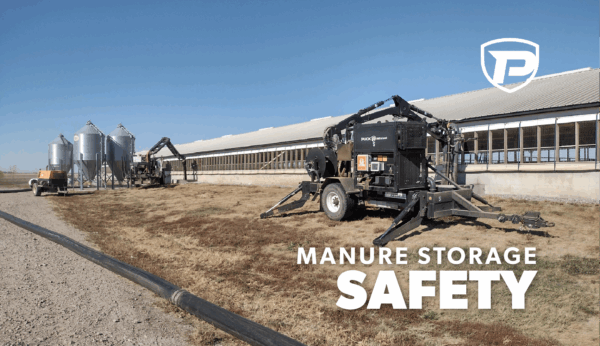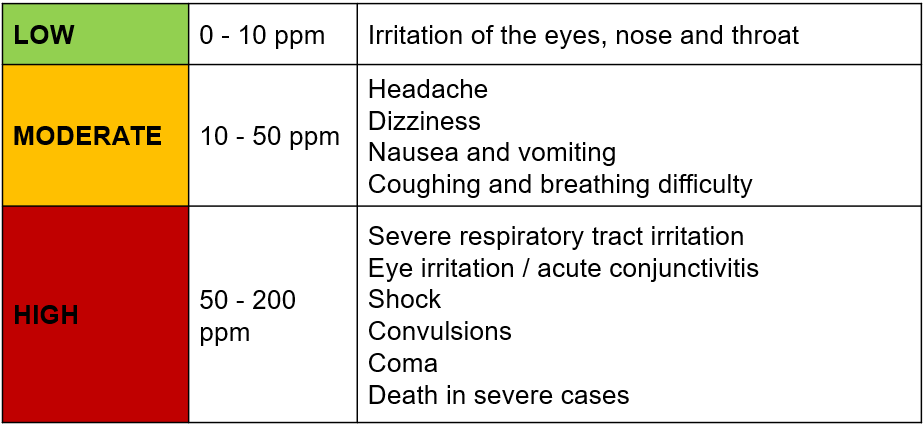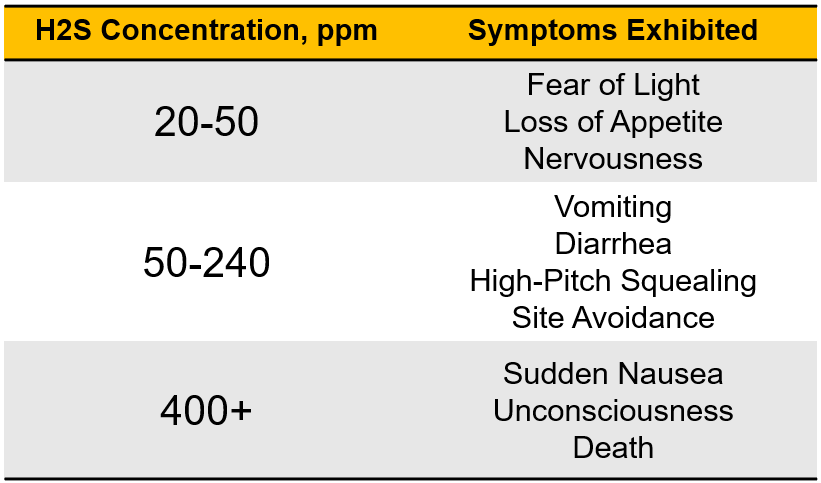
Manure Storage Safety
The Fall season is upon us, and farmers and custom applicators are out working in full force. This year, the National Farm Safety and Health Week takes place September 21 – 27 to raise awareness of safety practices in the agricultural industry. Manure storage safety can be particularly relevant to custom applicators and those who work with or around livestock manure storage facilities.
The gases released by manure can be harmful to humans and animals alike, and are made more dangerous when trapped in an enclosed area. Manure stored in a tank produces carbon dioxide (CO2), methane (CH4), ammonia (NH3), and hydrogen sulfide (H2S), among others. Carbon dioxide and methane are both asphyxiants, and ammonia is an irritant. Hydrogen sulfide, however, is toxic and can cause death within minutes of exposure. If the concentration is high enough, it takes only seconds of exposure to be fatal.
Warning Signs for H2S

Hydrogen sulfide levels and their effect on humans
The effects of hydrogen sulfide in humans can start showing with exposure of less than 10 parts per million (ppm). At this low level of exposure, the eyes, nose and throat can become irritated. Moderate levels of H2S range from 10–50 ppm and can cause headaches, dizziness, nausea and vomiting, coughing and breathing difficulties. These low to moderate level symptoms are an unkind warning to leave the area. Hydrogen sulfide exposure beyond 50 ppm can cause severe respiratory tract irritation, acute conjunctivitis, shock, convulsions, coma, or death.

Hydrogen sulfide levels and their effect on hogs
Beyond the human signs of hydrogen sulfide exposure, swine can also provide a warning with side effects of H2S exposure. Although hogs have a higher tolerance of hydrogen sulfide exposure, the symptoms can be a warning sign to humans to not enter the space without proper breathing equipment. At 20–50 ppm, pigs exhibit a fear of light, a loss of appetite, and nervousness. From 50–240 ppm, pigs will show signs of vomiting, diarrhea, high-pitch squealing, and site avoidance. Over 400 ppm, hogs will have sudden nausea, fall unconscious, or die.
Deep Pit Flash Fires
Hydrogen sulfide isn’t the only gas released from manure that can be potentially dangerous. The foam on manure captures and holds methane, a combustible gas, in a deep-pit and can cause flash fires and explosions. In the Fall of 2009 alone, eight fires in Iowa were known to have occurred due to deep-pit swine facilities. A 2013 survey of farmers in the Midwest U.S. and Canada found that about nearly a quarter of deep pits had foam. Proper ventilation during agitation and manure pumping can reduce the risk of flash fires in deep pits.
Open Air Pits Still Pose a Risk
Although less common, gases from an open, outdoor storage pit can also cause issues for humans, particularly during agitation. Drowning can also be a risk around open manure storage sites like lagoons and ponds. The crust at the top of manure storage can create a false sense of stability in holding a human’s weight, but can cause extreme difficulties in getting out of the manure once one has fallen in. Slips can occur if the banks of a lagoon are covered in manure, so try to keep the banks clean and dry to avoid falling in.
Many news articles reporting manure-related deaths will mention more than one person dying in a site accident. This is typically due to failed rescue attempts that, unfortunately, end up taking more lives. A 30 year review of fatalities at livestock manure storage-related facilities found that 22% of deaths involved unsuccessful rescue attempts. It is never recommended to enter manure storage after seeing someone collapse, even if you believe you are capable. Plan for accidents by keeping safety measures near every pit or lagoon, such as life preservers, throw ropes, and safety harnesses.
Manure storage safety precautions can prevent dangers to those working around it or agitating it. It is recommended that all workers wear H2S monitors and ventilate properly when working around livestock manure. Crews should regularly review safety precautions and tips to prevent injuries or death on the job. These precautions should also be given to any person, employee or otherwise, who goes near manure storage. For more information on safety around manure storage, call our experts at (712) 655-9200.

